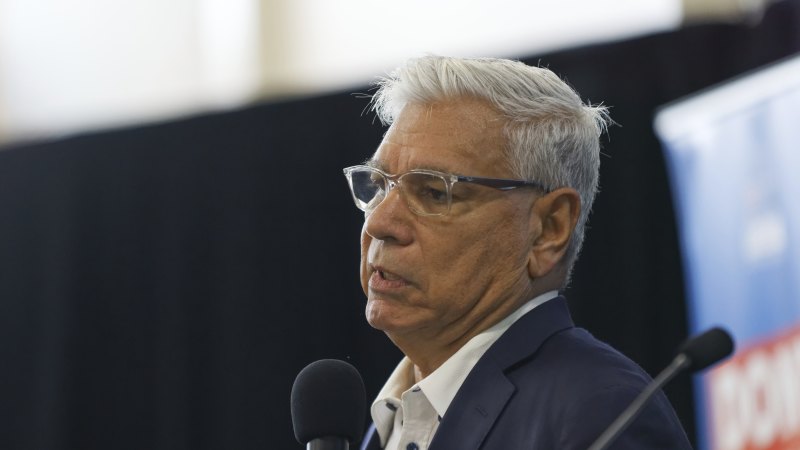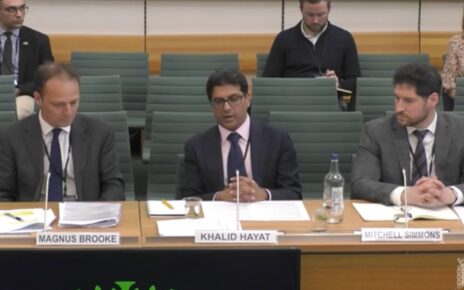Save articles for later
Add articles to your saved list and come back to them any time.
The Uluru Statement from the Heart, which first proposed a Voice to parliament, is a symbolic declaration of war against modern Australia, according to leading No campaigner Nyunggai Warren Mundine.
In a firebrand speech to the National Press Club on Tuesday, less than three weeks before Australians will vote in a historic referendum, Mundine will also claim the Yes campaign is built on a “litany of lies”, as he disputes the claim that 80 per cent of Australia’s first people back the Voice proposal and that Indigenous Australians aren’t listened to by policymakers.
Warren Mundine last week said he would not seek a Senate seat to replace outgoing former minister Marise Payne.Credit: Alex Ellinghausen
Describing the Voice as “a political ploy to grab power, not just from the Australian nation but also from traditional owners themselves,” Mundine will argue that it is “another lie” that “Indigenous representative body would give good advice and would change Indigenous lives for the better”.
“If this was true, the gap would already be closed because Indigenous voices have been giving advice to governments for decades. The fact is that Indigenous bodies can give bad advice, like the Coalition of the Peaks who advocated against cashless welfare cards. They don’t have all the answers and they haven’t been able to solve all the problems,” he says, according to a copy of his speech.
Head of the Recognise a Better Way campaign and president of the Voice No committee, Mundine is one of the most prominent members of the No campaign but, in a recent interview on the ABC’s Insiders program, surprised many when he backed treaties with Indigenous Australians and a change to the date of Australia Day.
Though he was originally the warm favourite, Mundine subsequently dropped out of the race to fill a casual vacancy for the Liberal Party in the Senate.
Taking a swipe at the Yes campaign, he will say that the Voice “is not about whether Indigenous Australians are recognised, respected or listened to. And it’s certainly not about how to improve the lives of those Indigenous people who continue to live in poverty, disadvantage and sometimes outright despair”.
Mundine will argue that “as Aboriginal people we have a choice: to continue to feel angry and aggrieved — to be trapped in the past — or to draw a line in history and move on from a clean slate”.
“The Uluru Statement comes from this place of continuing anger. It couldn’t be further from the idea of reconciliation … it sees Indigenous Australians as trapped in victimhood and oppression, not free or able to make their own decisions. It depicts self-determination as an aspiration, not something within reach today. This is a lie.”
Despite the fact Australia is on track to meet just four of the 19 closing the gap targets, and Indigenous Australians die eight years younger, on average, than other Australians, Mundine argues that “most Indigenous Australians are doing fine. They go to school, go to work, run businesses, take care of their families and they are not in prison. They don’t need a special Indigenous Voice”.
He says the biggest lie of all from the Yes campaign is that he and colleagues in the No camp including Coalition senators Jacinta Nampijinpa Price and Kerrynne Liddle don’t want things to improve for Indigenous people and have no ideas of how to help Indigenous people.
He argues there are four critical areas that need to be addressed: accountability for the billions already spent on Indigenous communities; ensuring Indigenous kids go to school; increasing economic participation and social change to end violence and abuse in communities.
Mundine’s speech comes less than two weeks since Price told the National Press Club that colonisation has been good for Indigenous Australians, a claim refuted by Indigenous Australians Minister Linda Burney, the Central Land Council and most published research, including a 2022 report by the Australian Institute of Health and Welfare, which finds “colonisation has had a devastating impact on Aboriginal and Torres Strait Islander communities and culture”.
Cut through the noise of federal politics with news, views and expert analysis. Subscribers can sign up to our weekly Inside Politics newsletter.
Most Viewed in Politics
From our partners
Source: Read Full Article



